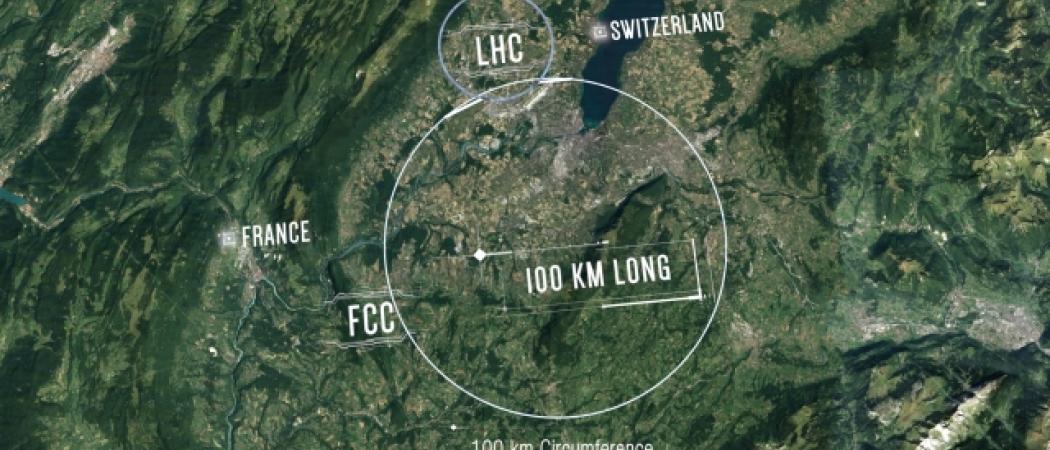The proposed accelerator, four times the size of the Large Hadron Collider, would smash particles together in a tunnel 100km long. But it may not happen if China goes ahead with a rival facility

The new accelerator would be three times larger than the existing Large Hadron Collider (LHC). Image: CERN
CERN has unveiled bold plans for the largest particle accelerator ever – almost four times longer and ten times more powerful than its 27 kilometre (5 mile) Large Hadron Collider (LHC).
The European particle physics research centre is proposing a €21 billion, 100 kilometre (62 mile) accelerator, given the working name of Future Circular Collider (FCC).
The proposal, one of several that scientists and government delegates from CERN member countries will debate in the coming years, sees the lab in an international race to host the LHC’s successor, with China and Japan mulling rival facilities.
The Japanese government is expected to take a decision on whether it wants to host – and stump up cash for – a linear collider by March 7. That could play into a potential choice by European countries about whether to back the FCC, foreseen to run in the late 2050s.
Meanwhile, a Chinese plan, like CERN’s, foresees a 100 kilometre tunnel built over the next decade.
Known as the Circular Electron–Positron Collider, it is being developed at Beijing’s Institute of High Energy Physics.
CERN’s current facility, the LHC, currently the world’s largest, is a looped tunnel running 100 metres beneath the Franco-Swiss border, near Geneva.
Scientists send electrons and their antimatter counterparts around the LHC to almost the speed of light and then smash them together to produce even smaller particles, in the hope of yielding evidence of previously unseen phenomena.
In 2012, scientists discovered the sought-after Higgs boson particle in the LHC, the last missing piece of the framework known as the Standard Model. The work netted François Englert and Peter Higgs the Nobel Prize in Physics the following year.
But the collider has not discovered any new particles since, pointing to a need to create a higher-energy machine. The LHC is expected to run its course by around 2040.
China after CERN’s crown
China’s competing collider is likely to influence the chances of ever seeing the FCC, which will be evaluated by an international panel of particle physicists, along with other proposals, as they draw up a new European strategy for particle physics by 2020.
Two similar super-colliders would not be a good investment for the world, experts say.
“There is certainly an element of competition between the two projects,” said Brian Foster, professor of experimental physics at Oxford University.
The Chinese project would be funded mainly from the Chinese government, but would also require international funding and international expertise.
“China does not have enough skilled experts to build such a project at the moment without outside involvement,” Foster said.
If China’s collider is built, “it is difficult to see how the FCC could go ahead at CERN”, Foster added. The Chinese project is too similar and would be completed several years before the FCC.
“It is very unclear, however, to what extent such a project is a Chinese government priority,” Foster said.





 A unique international forum for public research organisations and companies to connect their external engagement with strategic interests around their R&D system.
A unique international forum for public research organisations and companies to connect their external engagement with strategic interests around their R&D system.